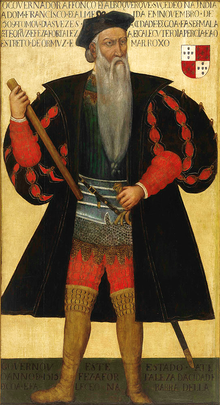Affonso de Albuquerque
| Afonso de Albuquerque | |
|---|---|
| Governor and Captain-General of the Seas of India Governor of India First Duke of Goa |
|
 |
|
| Duke of Goa | |
| Tenure | 1515 |
| Successor | Brás de Albuquerque |
|
Issue
Brás de Albuquerque, 2nd Duke of Goa
|
|
|
Full name
Afonso de Albuquerque
|
|
| Noble family | Albuquerque |
| Father | Gonçalo de Albuquerque |
| Mother | Leonor de Menezes |
| Born | 1453 Alhandra, Kingdom of Portugal |
| Died | 16 December 1515 Goa, Portuguese India |
| Buried | Igreja da Nossa Senhora da Graça, Lisbon, Kingdom of Portugal |
| Occupation | Admiral Governor of India Duke of Goa |
Afonso de Albuquerque, Duke of Goa (Portuguese pronunciation: [ɐˈfõsu dɨ aɫbuˈkɛɾk(ɨ)]; c. 1453–16 December 1515) (also spelled Aphonso or Alfonso), was a Portuguese general, a "great conqueror", a statesman, and an empire builder.
Afonso advanced the three-fold Portuguese grand scheme of combating Islam, spreading Christianity, and securing the trade of spices by establishing a Portuguese Asian empire. Among his achievements, Afonso was the first European of his Renaissance to raid the Persian Gulf, and he led the first voyage by a European fleet into the Red Sea. His military and administrative works are generally regarded as among the most vital to building and securing the Portuguese Empire in the Orient, the Middle East, and the spice routes of eastern Oceania.
Afonso is generally considered a military genius, and "probably the greatest naval commander of the age" given his successful strategy—he attempted to close all the Indian Ocean naval passages to the Atlantic, Red Sea, Persian Gulf, and to the Pacific, transforming it into a Portuguese mare clausum established over the opposition of the Ottoman Empire and its Muslim and Hindu allies. In the expansion of the Portuguese Empire, Afonso initiated a rivalry that would become known as the Ottoman–Portuguese war, which would endure for many years. Many of the Ottoman–Portuguese conflicts in which he was directly involved took place in the Indian Ocean, in the Persian Gulf regions for control of the trade routes, and on the coasts of India. It was his military brilliance in these initial campaigns against the much larger Ottoman Empire and its allies that enabled Portugal to become the first global empire in history. He had a record of engaging and defeating much larger armies and fleets. For example, his capture of Ormuz in 1507 against the Persians was accomplished with a fleet of seven ships. Other famous battles and offensives which he led include the conquest of Goa in 1510 and the capture of Malacca in 1511. He became admiral of the Indian Ocean, and was appointed head of the "fleet of the Arabian and Persian sea" in 1506.
...
Wikipedia
